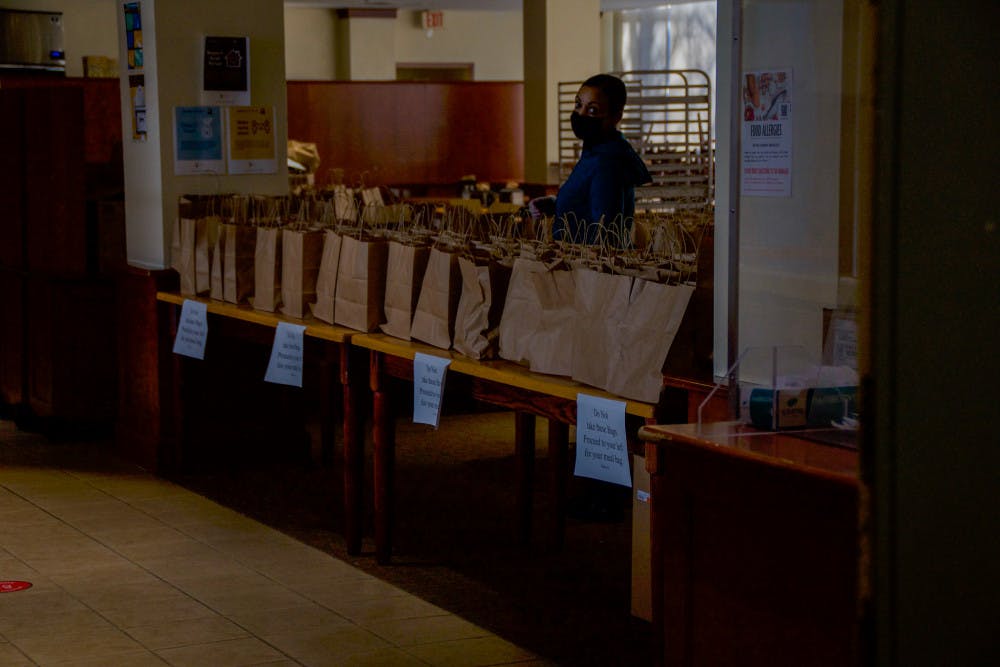Gail McCarthy, a beloved Brown Dining Services cashier, found herself doing much more than her typical role of swiping ID cards and doling out smiles during the spring semester’s unusual start. McCarthy, along with a number of Dining Services staff, worked to prepare and bag the 7,000 meals produced daily for hungry students over Quiet Period.
McCarthy works from 6:30 to 10:30 a.m. each day prior to cashiering. “There’s just so many bags, everybody has to do it of course,” she said. “It’s more work involved for everyone.”
With only four of the University’s dining halls open for the spring semester per the University’s Plan for a Healthy and Safe 2020-21, Dining Services has had to prepare the large output of meals using reduced facilities, Director of Dining Programs George Barboza wrote in an email to The Herald.
To decide which dining halls would open for the spring, Dining Services partnered with other University offices to factor in “things like functionality of the space, proximity to student housing and most importantly, student and staff safety,” he added. Students living both on and off campus in Providence were eligible to pick up meals at assigned locations during assigned time slots beginning Jan. 9.
Dining Services has also been operating with fewer employees. Following the initial closure of campus in the spring, many intermittent employees, including some Dining Services workers staffed through external agencies, could not continue their assignments remotely and were terminated, The Herald previously reported.
During Quiet Period, the culinary staff cooked the day’s meals while McCarthy and other Dining Services members worked to ensure bags contained utensils, sides, condiments and anything else students would need for their meals.
“It’s definitely a lot more labor-intensive,” McCarthy said. “It’s not really hard, but when you’re doing a hundred bags at a time (it can be tiring).”
Preparing the bags can also feel like an endless task, she added.“You’re never really through with it,” McCarthy said, because once you finish preparing bags for one meal, you have to start “the bags for the next day.”
Additionally, as positive COVID-19 cases continue to rise on a national level, dining operations must maintain heightened health precautions for the safety of students and staff alike.
According to Barboza, safety measures for staff members include wearing masks at all times, social distancing, testing for COVID-19 twice weekly, working in pods, cleaning regularly and installing protective barriers in all units.
Limited student dining options due to campus dining restrictions also led Assistant Director of Wellness and Nutrition Jessie Curran to navigate increased concerns from students regarding their specific dietary needs.
Curran received more “inquiries from incoming students than any other year. Due to the way the University and Dining would be operating this year, more students were concerned with what would be available for their unique situations,” she wrote in an email to The Herald.
“The list of nutritional considerations is long,” she added, including allergies, religious restrictions and other lifestyle factors. “There is no menu conversation that does not include these topics as part of the discussion.”
Dining Services also welcomes student feedback, Barboza added. Online comments and targeted surveys throughout the semester are considered by the team that develops the menu for each meal, he wrote.
With the large number of packaged meals distributed during Quiet Period, Dining Services also had to consider issues surrounding sustainability and waste, and worked with the Office of Sustainability to determine which disposable products to use, Curran wrote.
In an effort to minimize waste and meet needs as indicated by student feedback, Curran wrote that Dining Services chose to “no longer provide a dessert at every meal and instead offer a salty snack for the afternoon meal.”
When stage two of Quiet Period began Jan. 23, students living on campus and enrolled in the spring meal plan became eligible to visit any on-campus dining location, according to a campuswide email from Associate Vice President for Campus Life Vanessa Britto and Dean of Students Koren Bakkegard.
Students living in River House, Chestnut Commons and the Omni Hotel became eligible to access any on-campus dining location on Jan. 27, after Quiet Period ended. Additionally, students not enrolled in the spring meal plan were no longer provided meals following Jan. 26, the end of Quiet Period, Britto and Bakkegard wrote. As campus transitions out of Quiet Period, some restrictions on student dining have similarly changed, including pod members being allowed to eat meals together.
McCarthy hopes that students and staff will stay healthy even after the end of Quiet Period.
“I’m just hoping the college doesn’t have any big breakout, because that would turn everything back again and we’d have to start over,” she said. “It’s so much nicer when there’s a little more freedom.”
McCarthy also hopes that this freedom will help students have a meaningful semester at Brown. “I’m older and (the new responsibilities and guidelines) are just part of my job,” she said. But having freedom is “part of the college experience, to enjoy yourself and move around and do what kids do.”

Jack Walker served as senior editor of multimedia, social media and post- magazine for The Herald’s 132nd Editorial Board. Jack is an archaeology and literary arts concentrator from Thurmont, Maryland who previously covered the Grad School and staff and student labor beats.





